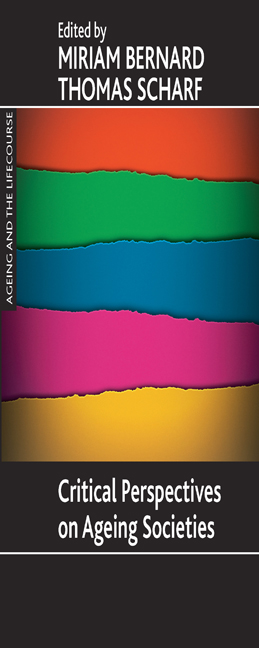two - Critical gerontology: reflections for the 21st century
Published online by Cambridge University Press: 14 January 2022
Summary
Introduction
Critical gerontology, we believe, must engage in serious but respectful critique of more traditional social gerontology since we assume similar ends but adopt different approaches, sources of knowledge and epistemological stances. In this chapter, we explore where the field of critical gerontology is today in terms of its major commitments and concerns, the way it approaches its multiple tasks, and the opportunities and obstacles it faces as we move further into the 21st century. Although we also look briefly at where more traditional social gerontology is at this juncture, this will be more the backdrop than the central concern of our discussion.
Like beauty, critical gerontology may be in the eyes of the beholder. However, Baars (1991, p 221) succinctly described it as a “collection of questions, problems, and analyses that have been excluded by the established mainstream”, while Phillipson and Walker (1987, p 12) characterised it as “a more value-committed approach to social gerontology – a commitment not just to understand the social construction of aging but to change it”. Together with our feminist colleagues, Miriam Bernard (2001) and Ruth E. Ray (1996), we also view critical gerontology as an umbrella term that takes as its object the philosophical foundations, epistemological assumptions, and social influences on which social gerontology has been constructed. Furthermore, as philosopher Richard Bernstein (1992, p 162) suggests, “the primary task of the critic is to analyze the present and to reveal its fractures and instabilities and the ways in which it at once limits us and points to the transgressions of those limits”. From these various perspectives, and toward the end of exploring where critical gerontology is today, this chapter aims to:
• update observations regarding the two paths along which critical gerontology has been travelling (Minkler, 1996);
• adopt a ‘critical’ stance that transforms the ‘taken for granted’ into a problem to be examined;
• expand on the feminist voice in gerontology and philosophy with its focus on standpoint, embodiment and moral perception;
• consider the impact on critical gerontology of those voices beyond feminism that have called out for far greater attention to the meaning and significance of racial/ethnic and other forms of diversity in our increasingly heterogeneous ageing societies; and,
• look ahead.
- Type
- Chapter
- Information
- Critical Perspectives on Ageing Societies , pp. 13 - 26Publisher: Bristol University PressPrint publication year: 2007



